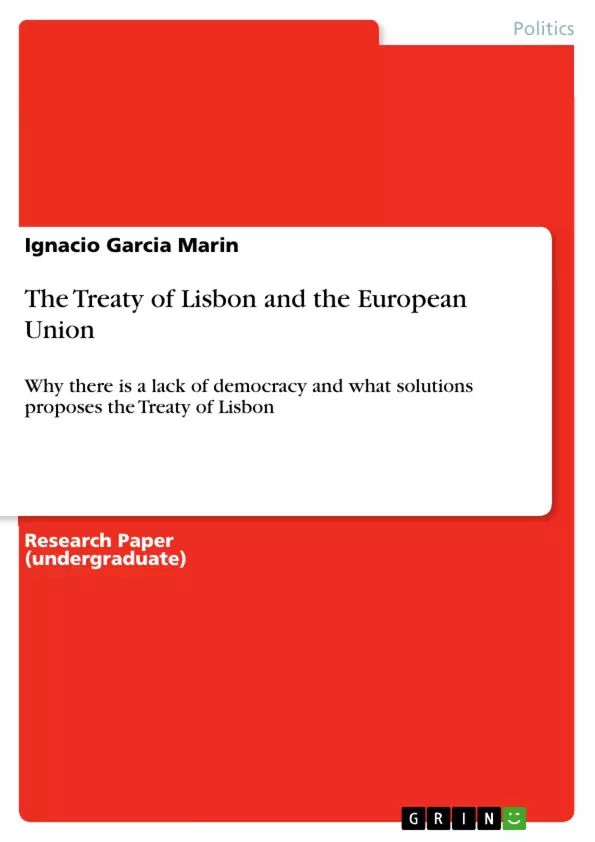Since the Treaties of Rome in 1957, with the official birth of today's European Union, the controversy about the role of citizens and institutions have been recurrent. In contrast with other cases of political integration, like Italy and Germany during XIX century1, where citizens and cultural movements supported and participated actively, in the case of the EU we cannot find considerable popular activism. In fact, it is more easy see skepticism or misgivings, and usually the political elites try to convince us about the benefits of an integrated Europe. One reason could be that the European integration has been made many times without the people and really they do not know what exactly is this Union.
Theoretically, the Treaty of Lisbon was an opportunity to reduce this lack of legitimacy with some innovations, as for example the citizen petition or more co-decision between the European Parliament and Council of the European Union. However, the European guidelines are still marked by Heads of State and Ministers, where today Angela Merkel and Nicolas Sarkozy share great part of the political power in Europe, but, is the Treaty of Lisbon adequate to give more democratic legitimacy to the European Union?
Introduction
Since the Treaties of Rome in 1957, with the official birth of today's European Union, the controversy about the role of citizens and institutions have been recurrent. In contrast with other cases of political integration, like Italy and Germany during XIX century[1], where citizens and cultural movements supported and participated actively, in the case of the EU we cannot find considerable popular activism. In fact, it is more easy see skepticism or misgivings, and usually the political elites try to convince us about the benefits of an integrated Europe. One reason could be that the European integration has been made many times without the people and really they do not know what exactly is this Union.
The idea of an integrated Europe was considered in their origins as a solution for stop the recurrent European wars and an attempt to create a political block capable to rebuild western Europe. However, this project has always been led by European leaders, with evident lack of democracy and reduced role for citizens. For example, the powers of the European Parliament have been historically very limited and the importance of the European Commission is still far from being a “European Government”.
Thus, many authors point out that there is a democratic deficit [2] in the functioning of the European Union, where the Parliament is the only institution with democratic legitimacy[3], but with a weak authority.
Theoretically, the Treaty of Lisbon was an opportunity to reduce this lack of legitimacy with some innovations, as for example the citizen petition or more co-decision between the European Parliament and Council of the European Union. However, the European guidelines are still marked by Heads of State and Ministers, where today Angela Merkel and Nicolas Sarkozy share great part of the political power in Europe[4].
Then, the question is clear: there is a democratic deficit, but, is the Treaty of Lisbon adequate to give more democratic legitimacy to the European Union?
[...]
[1] I know that the Italian and German integration have many differences with the European integration, but in a certain way they have some similarities as examples of political integration of some countries to create a bigger political unit.
[2] I am not going to discuss the meaning of “democratic deficit”, but current literature keeps a controversy about it. I only want to say that there are different points of view about how to create a source of legitimation. Milev indicates three types of legitimacy depending of the type of integration: popular sovereignty at state and union level of governance and communitarism; national sovereignty and communitarian principle; and economic efficiency (2004:13).
[3] M. Milev. “A democratic deficit in the European Union (2004: 23)
Frequently asked questions
What is the central issue discussed in this text?
The text focuses on the persistent debate regarding the roles of citizens and institutions within the European Union, particularly concerning the presence of a perceived democratic deficit. It questions whether the Treaty of Lisbon adequately addresses this deficit and enhances the democratic legitimacy of the EU.
Why is there a lack of popular activism in the EU compared to historical integration examples like Italy and Germany?
The text suggests that European integration has largely been driven by political elites, resulting in limited citizen involvement and understanding of the EU. This disconnect leads to skepticism and a feeling of being excluded from the decision-making process.
What was the original motivation behind European integration?
Initially, the idea of a unified Europe was envisioned as a means to prevent recurring European wars and establish a strong political bloc to facilitate the reconstruction of Western Europe.
How does the European Parliament contribute to democratic legitimacy within the EU?
The European Parliament is identified as the only EU institution with democratic legitimacy due to its elected representatives. However, the text highlights its historically limited powers, contributing to the overall democratic deficit.
What innovations were introduced by the Treaty of Lisbon to address the democratic deficit?
The Treaty of Lisbon aimed to improve legitimacy through measures such as citizen petitions and increased co-decision powers between the European Parliament and the Council of the European Union. Despite these efforts, the text argues that significant political power remains concentrated with national leaders.
Who are mentioned as key political figures shaping European policy?
Angela Merkel and Nicolas Sarkozy are specifically mentioned as influential leaders who hold significant political power within Europe.
What is the core question explored regarding the Treaty of Lisbon?
The primary question posed is whether the Treaty of Lisbon is sufficient to overcome the democratic deficit and provide a more democratic foundation for the European Union, considering the continued influence of national leaders.
- Arbeit zitieren
- Lic. Soc. Ignacio Garcia Marin (Autor:in), 2011, The Treaty of Lisbon and the European Union , München, GRIN Verlag, https://www.grin.com/document/182026



